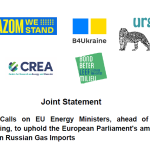Today, civil society organisations in 13 countries have sent open letters to their Ministers, urging them to boost ambition of their proposal for the EU’s largest climate tool, the Effort Sharing Regulation (ESR). As EU leaders reaffirmed their full support for the Paris Agreement last week in response to the US retreat, the ESR negotiations are a good litmus test of their commitment.
The letters sent out today are part of a European wide “day of action” where people from all around Europe show that there is an unprecedented consensus behind the need for the EU to increase ambition of its domestic climate policy. The reason for action today is that government representatives are meeting to discuss their position on this key climate proposal in Brussels. They are expected to present progress they have made in the negotiations during the Environment Council in less than two weeks. Ministers will determine whether the regulation safeguards the zero carbon transition or is crippled through weak targets and loopholes.
The ESR covers a whopping 60% of the EU’s greenhouse gas emissions and sets national binding targets for each Member State to reduce emissions from transport, buildings, waste and agriculture for the period 2021–2030. A well-crafted, ambitious regulation will make a real difference to people’s everyday lives. Targeted building insulation programmes lead to healthier and happier homes, and tackling transport emissions will reduce the air pollution blighting European cities. Emissions policies can help struggling farmers reduce costs and generate revenue from their waste materials and new services, and a stronger ESR can support the European circular economy transition, boosting jobs and growth.
However the effectiveness of the instrument is threatened by weak ambition. The overall target is too weak. The emissions level set for the starting point in 2021 is too high (see our infographic published today). And loopholes further water down the weak proposal.
The target of -30% compared to 2005 levels proposed by the European Commission (the EU executive) means the EU aims to reduce its emissions by merely 1% per year over the next 16 years, while in the last five years an annual reduction of almost 2% was achieved. It also means we postpone necessary reductions to much later. To be in line with the EU’s commitment to the Paris Agreement, a target of at least 47% for the ESR sectors would need to be adopted.
EU Member States have so far shown little appetite to do their homework and improve the Commission’s weak proposal. Instead many countries are trying to weaken it further by asking for existing loopholes to be enlarged or even new ones to be added. This is unacceptable. We heard many EU leaders stating that the EU would be at a forefront of the global fight against climate change last week, when President Trump announced he would withdraw the US from the Paris Agreement. Now it is time to move from statements to action and make the ESR proposal Paris-proof.
The actions today, including the letters to Ministers signed by organisations in 13 countries send a loud and clear signal to EU Ministers: citizens will not accept it if you do not take your commitments to the Paris Agreement seriously.
You can find all the letters sent to Ministers here: http://carbonmarketwatch.org/esr-eu-day-of-action/
By Caroline Westblom, EU Climate & Energy Policy Coordinator at CAN Europe



